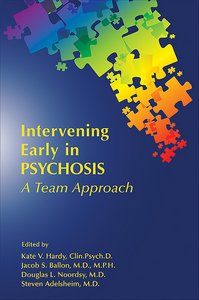Decoding Delusions
A Clinician's Guide to Working With Delusions and Other Extreme Beliefs
View Pricing
Description
For the individuals experiencing them, delusions and strong beliefs can be profoundly distressing and extremely limiting to healthy living. They also present significant challenges to the mental health professionals working with these individuals—not least because there is not always consensus around what might be considered delusional.
For the first time, Decoding Delusions gathers the literature and treatment guidance materials related to delusions in one place to offer clinicians an up-to-date, culturally informed, and illustrated guide to managing the spectrum of delusions and other extreme beliefs encountered in daily practice.
In Part I, chapter authors define and assess delusions, examining the current research literature into their linguistic and cultural aspects, as well as the history of their treatment. Crucially, it also provides a lived-experience perspective.
Part II features the insights of a series of international experts on interventions—including third-wave cognitive-behavioral models such as compassion-focused therapy—for delusional presentations that include the following:
- Persecutory paranoia
- Delusional jealousy
- Erotomania
- Capgras syndrome
- Delusions of thought possession
- Trauma as a pathway to delusions
Readers also will find a nuanced discussion of working with patients from Japanese backgrounds that will enhance their cultural competency and encourage them to think about extreme beliefs through a cultural lens.
In Part III, the chapter authors explore the management of delusions in specific settings. Examples include delusions in forensic settings and use of remote technologies such as Zoom and digital media for measurement-based care. Finally, live-action demonstrations of key clinical skills at work are provided through video clips.
Unlike any other resource currently available, Decoding Delusions proposes an approach that supports the exploration of extreme beliefs with the aim not only of distress reduction but also meaningful recovery.
Contents
- Section 1: Delusions: Theoretical, historical and lived perspectives
- Chapter 1. Delusional Beliefs and the Madness of Crowds: What are beliefs and why are some of them pathological?
- Chapter 2. The Lived Experience of Strongly Held Beliefs
- Chapter 3. Considering Delusions through a Cultural Lens
- Chapter 4. The psychology of paranoid beliefs
- Chapter 5. Linguistic techniques for clinicians working with clients with delusions
- Chapter 6. The Curious Case of Schreber
- Section 2: Treating Delusions: types, techniques and settings
- Chapter 7. Assessing delusions
- Chapter 8. Collaboration not collusion: Normalizing and befriending
- Chapter 9. CBT for Paranoia: conceptualization, process and techniques
- Chapter 10. At Risk Mental State: Delusional presentations
- Chapter 11. Erotomania and sexual delusions.
- Chapter 12. A bizarre and grandiose delusion: persecution of a goddess using social media and microbots.
- Chapter 13. Who Are You? -Capgras and Other Delusions of Misidentification
- Chapter 14. Thought disorder or a problem with communication?
- Chapter 15. Trauma and delusions
- Section 3: Working with delusions in different settings
- Chapter 16. Cognitive Behavioral Therapy for delusions within Japanese culture
- Chapter 17. A CBT approach to working with delusions in forensic settings
- Chapter 18. Using Digital Health Technology to Facilitate Measurement-Based Care in the Treatment of Delusions
- Chapter 19. CBT-informed skills training for families caring for a loved one with delusions
- Chapter 20. Decoding Delusions: Demonstration of Key Skills for working with unusual beliefs
Contributors
- Richard P. Bentall, Ph.D.
H. Teresa Buckland, Ph.D., M.Ed.
Patricia Cawthorne, D.N., M.Sc. (CBP), RMN
Briana Cloutier
Lisa Dixon, M.D., M.P.H.
Kathryn Eisen, Ph.D.
Kathryn Elliot, M.Sc.
Audrey Francoeur
Michael Garrett, M.D.
Christopher Komei Hakusui, B.A.
Kate V. Hardy, Clin.Psych.D.
Charles Heriot-Maitland, Ph.D., D.Clin.Psy., M.A., B.Sc.
Vyv Huddy, Ph.D.
Shaun Hunt, M.Sc., B.Sc.
Akiko Kikuchi, Ph.D.
David Kingdon, M.D., FRCPsych
Sarah Kopelovich, Ph.D.
Melanie Lean, Clin.Psych.D.
Latoyah Lebert, M.Phil.
Tania Lecomte, Ph.D.
Anton P. Martinez, M.Sc. Ph.D.
Maria Monroe-DeVita, Ph.D.
Kim T. Mueser, Ph.D.
Karina Muro, Ph.D.
Farooq Naeem, Ph.D., MRCPsych
Shannon Pagdon, B.A.
Dimitri Perivoliotis, Ph.D.
Peter Phiri, Ph.D., RNMH, CBT (DipHE)
Shanaya Rathod, D.M., MRCPsych
Sarah Robinson, B.Sc.
Kristin Lie Romm, Ph.D., M.D.
Nazneen Rustom, Ph.D., B.A., GMBPsS
Kenneth Sandoval, Jr., M.S., M.S.W., LCSW
Leigh Katharine Smith, Ph.D.
Helen M. Spencer, B.A.
Laura M. Tully, Ph.D.
Douglas Turkington, M.D., FRCPsych
Gordon Turkington, M.Sc., B.Sc.
Mark van der Gaag, Ph.D.
About the Authors
Kate V. Hardy, Clin.Psych.D., is Clinical Professor, Department of Psychiatry and Behavioral Sciences, Stanford University School of Medicine, in Stanford, California.
Douglas Turkington, M.D., FRCPsych, is Professor of Psychosocial Psychiatry at Newcastle University and Consultant Psychiatrist at CNTW NHS Foundation Trust, St. Nicholas Hospital, in Newcastle upon Tyne, UK.
Related Products
Carousel Control - items will scroll by tabbing through them, otherwise arrows can be used to scroll one item at a time








